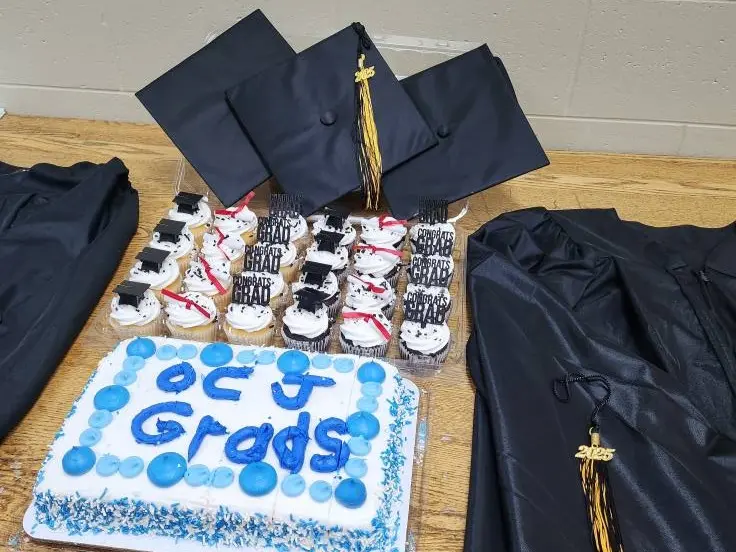

Five Incarcerated Students Celebrate High School Graduation at Oneida County Jail
Earlier this month, five incarcerated students at Oneida County Jail celebrated earning their high school diplomas at a graduation ceremony, which looked a little bit different than most high school graduations.
A small group of current students and staff gathered in the stark library. Chairs were arranged in a circle, and the graduates donned the traditional gown, cap, and tassel over their orange jail uniform and plastic crocs. Someone played “Pomp and Circumstance” on their phone as each graduate moved around the circle, shaking hands and receiving high fives and knuckle bumps.
The graduate’s name was announced, and he received his diploma to cheers and whistles and applause as the graduate switched the tassel on his cap from right to left. Each graduate spoke of his journey and thanked all those involved for this opportunity to change. Then there was cake and ice cream.
The graduates are part of an adult basic education program, a partnership between Nicolet College and jails in Oneida, Vilas and Forest counties. Over the last year, the state grant-funded educational program has awarded 46 General Education Development Diplomas (GEDs) and High School Equivalency Diplomas (HSED) at the three locations.
“Now that I have my HSED, so many doors will open for me, not just job, but the chance to start my own business. There are not a lot of things you can do without a diploma, but thanks to the (the program), my life has changed,” wrote one graduate.
Incarcerated students recognize that earning a high school diploma, which many originally regarded as unnecessary, is important and opens doors. One graduate commented, “I was told there is an HSED program here, and I decided to give the program a try. I figure that I need to start somewhere if I want to change my circumstances. This is the first step.”
Sheriff Grady Hartman is a strong supporter of education at Oneida County Jail. “The partnership we have shared with Nicolet College is amazing,” Hartman said.
“These inmates have taken advantage of the time they have here and the commitment these instructors have made to assist them and will leave with a positive achievement that they can use to improve their lives and their families’ lives once they are released,” Hartman added.
Incarcerated students who transfer to state prisons can earn certification in vocational occupations such as welders, electricians, plumbers, truckers, barbers, and more. Some prisons even offer college course work. However, inmates must first have a high school diploma to enter any of these programs.
Without an education and the prospect of a job that provides a family-supporting income, it is likely that they will be incarcerated again upon their release. Wisconsin Technical College System data show that incarcerated people who participate in adult basic programs are 43% less likely to reoffend after release.
Reducing chances of reoffending also saves taxpayers money. The Wisconsin Department of Corrections estimates it costs around $30,000 per inmate annually for housing, clothing, food, and medical expenses, so reducing the number of people and time spent in jails may represent a significant cost saving for taxpayers.
This initiative is part of a broader statewide effort, with Wisconsin’s technical colleges annually serving thousands of incarcerated individuals through basic education, credentialing, and workforce readiness programs. Under the proposed federal budget currently being considered in Congress, funding for the American Education and Family Literacy grant, which funds basic education programs like the one at Oneida County, is uncertain.